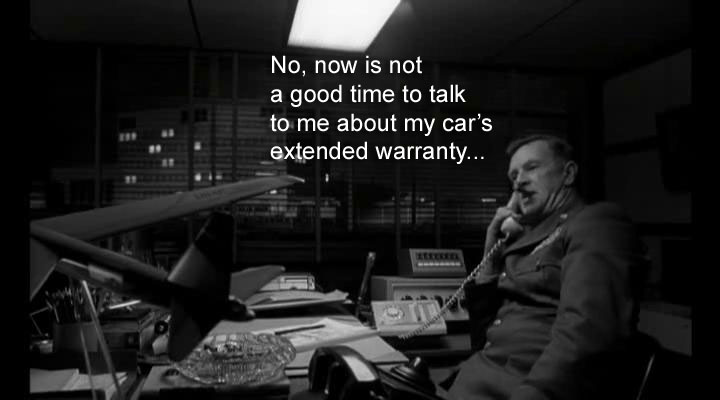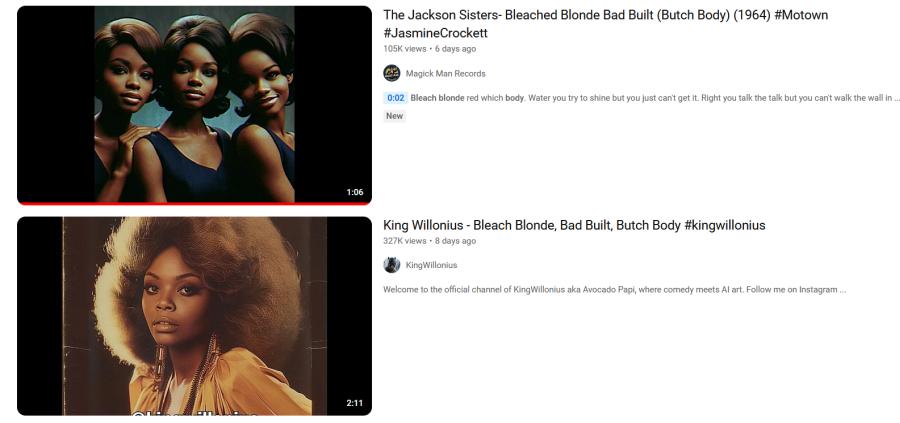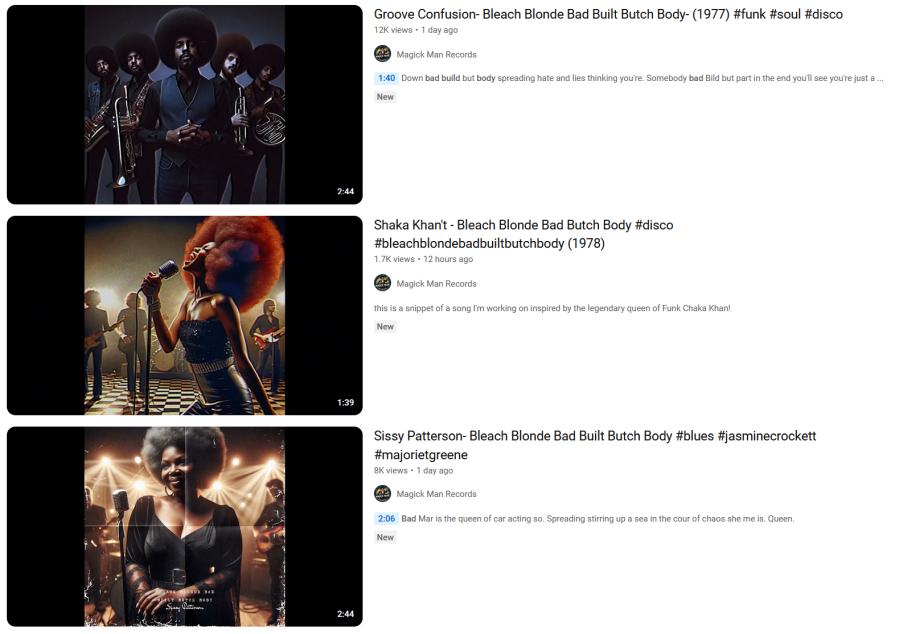Let’s get a bit paranoid, shall we?
Of course it’s silly to think one is being paranoid when discussing capitalism: they are out to get us. It’s worse than that, actually, they are out to get us by any and every path that is possible. Every path. It’s nothing new, remember when Will Smith became briefly notorious for inserting something close to a dozen product placements in I, Robot and I am Legion? Eventually, it’s going to pervade everything.

It can be funny, but I’m afraid that sneaky marketers will invade every orifice of our bodies, polluting our vital essences and natural fluids, until… uh… never mind.
Unfortunately, I may have been prescient, but more likely I was just playing catch-up: the big tech companies have decided less to be victims of AI than abusers of it. This stuff may sound a bit paranoid, but that’s the world I live in. OK, so perhaps you’ve heard of the glorious and brilliant Jasmine Crockett’s smackdown of Marjorie Taylor Greene (if you haven’t, you should) for being a piece of racist shit. The key phrase left over from that meme is “Bleach Blonde Bad Built Butch Body” (when you are a proudly ignorant aerobics instructor, do not cross verbal swords with a JD who holds a couple of doctorates) anyhow, the very next day, youtube began to saturate with AI-generated thumbnails of AI-generated music about the meme, e.g.:

Look at the view stats on those: 327,000 views and 105,000 views in 8 days. These are, actually, not bad! They’re AI music generated with (probably) GPT40 lyrics, and a motown-sound training set. And then there’s the funk version:

I vacillate between horror and amusement. “Shaka Khan’t” is pretty creative naming. I have not listened to most of these because once the algorithm determines that you’ve watched one, it’s going to offer you more and more until that’s all you’re getting.
It shouldn’t surprise you in the least bit to know that AI music generation systems are getting as good, as fast, as the image generators. (Yeah, yeah, I expect some purist snark) but the point is the one I belabored in my posting last year about John Ringo [stderr] AI is not going to overwhelm the great musicians or songwriters, but it’s sure as hell going to suck the oxygen out of the market for mediocrity. Once AI story tellers get just a smooch better, the market for John Ringo’s style of kill-porn is going to be saturated very quickly.
A friend of mine did a book on AI, using an AI to write it. He wrote a script that asked GPT-3 to write an outline in bullet point form, for a book on “AI in Cybersecurity”. Then, his script took each bullet point, named it “Chapter 1: Introduction to AI” (or whatever) and asked GPT-3 to write a chapter outline … then, recursively, parsed the outline and randomly asked it for a caption for an illustration where appropriate, and handed that off to Midjourney to generate a chart. I was an unofficial advisor to the project, and taught him how to give Midjourney a couple of existing charts, to ensure that all the graphics in the book had similar look and feel. It’s all complete bullshit, of course. Total run-time 15 minutes to a complete 190 page book with 35 full-page color charts a cover, and an index (the index was generated using the ancient UNIX permuted index generation tools over the output text). Then, the joke was on us: the prime instigator attempted to upload the E-book version to several platforms, all of which, apparently, have ingestion queues that are completely jammed with AI-generated MILSF by a million monkeys with infinite time on their paws. Basically, the publication pipeline is like a septic system that has had a box of tampax flushed down it at one time: it’s jammed and everything is backing up.
So, now let’s get weird and paranoid.
One obvious explanation for the AI Bleach Blonde Bad Built Butch Body music is that someone with a moderate sense of humor, some scripting skill, and a GPU, has just made $50,000 off of one night’s work. That’s all fun and games until someone starts having AI pop out anti-vax or political messages. I know “flooding the zone” is nothing new, but when the barrier to entry gets too low, everybody has a MILSF novel they want to win a Hugo with. But it gets weirder, and worse. In my last posting [stderr] I described how we might be finally seeing the end of basic internet advertising, because the barrier to entry has dropped so low that anyone who wants to can advertise some crap. But what happens when the capitalists see that coming? Here’s what they do: they create their own crap, then boost it in the algorithm so that you are more likely to watch their crap than someone else’s crap, and therefore they don’t have to pay any ad revenue out to content creators, they just pocket it. What if those songs above were created in a dark Laboratory of Evil down in the sub-basement bunker below Google HQ?
There are loads of AI-generated tracks on youtube, now. Some of them are quite good. And then, because people are horrible and skeevy, there are the fly-by-night accounts that take something popular, re-post it, and try to get a few search clicks before it gets demonetized. I was going to post an embed of one of my favorites, which is an AI version of Elvis singing “Baby’s Got Back” that is actually quite good, but when I searched for it, I got 3 pages of re-postings of the original. What if some of those re-postings are not fly-by-night operators, what if they are done by the Dark Laboratory of Evil at Google? See what I’m saying? They capture the clicks, they don’t demonetize, they don’t pay themselves, and they still get the ad revenue from the views.
This is actually quite good, and the AI popped in a bit of yodel in the right place. Brilliant:
I was thinking these slightly paranoid thoughts (it’s not “paranoid” if they actually are out to get you!) when Rick Beato posted this piece. Beato has been doing some interesting posts lately, asking “why is pop music such shit”? Good question. I think it’s simply that it’s becoming easier and easier to get over the fairly small barrier to entry to be a pop star. You need someone reasonably good looking, who can wave their arms about rhythmically, an AI choreographer, an AI backing track, and a few AI lyrics. Then, you pay a bunch of marketing to pop it into the rotation so a lot of people see it, some click on it, and suddenly you have a hit. I know it’s more complicated than that by a large margin but from what I gather the music world has its strata, similar to the writing world, the art world, etc. – you’re not competing with Carlos Santana, you’re competing with Nickleback. And, since the music industry has basically been stabbed through the heart, like book publishing was, the only option is self-promotion and that’s a brutal filter, indeed. So, I’m going to briefly summarize the theory, but I think the whole piece is pretty interesting:
Gioia’s theory is that the big music platforms are doing the same sort of thing I was talking about with the AI music above. Gioia says that there’s some one account that has, literally, billions of plays on the portfolio, which makes that person(AI) bigger than The Beatles and Led Zeppelin, etc. And it’s kind of so-so boppy stuff that’s not intolerable so it doesn’t cause people to throw their music player in frustration. But it’s track-plays or click-throughs that the music platform doesn’t have to pay an artist for, because they own the artist. The artist is an AI down in the sub basement below HQ, consuming a percentage of the total music play-time with stuff that the platform owns and doesn’t have to pay anyone for. Think about it: if you slip 5% of glarp into someone’s playlist, and it’s glarp that they never hear again and don’t really care about one way or another, you’ve just increased your profit margin by 5%. Which, if you’re talking about large volume businesses like the music platforms, is a hell of a lot of money. Gioia’s other point, which is well-taken, is that it establishes a cost-cutting floor if you have to re-negotiate with artists. “Well, we have a guy whose last track got 100 million playthroughs and he asked for half of what you’re asking for, I suggest you take our offer.” This is, basically, a trick capitalists use over and over to exploit laborers; it would be familiar to Andrew Carnegie who made a vast fortune using exactly that trick. Before AI came along, the big animation studios were farming cell-by-cell animation out to manual render-farms in North Korea [guy delisle] which allowed them to negotiate with other artists as, “Are you kidding? I know someone who’ll do that for half of what you’re asking!”
Rather than hire an artist (which I wasn’t going to do, anyway) I had stable diffusion take a one-shot cover art for me. Just so I could end on a good note. Who doesn’t love a 1970s afro?

[Prompt I used was: a detailed album cover for a funk soul band from the 1970s called “BLARGH” with 2 beautiful black women with big afros wearing sexy spandex outfits and lots of cleavage, funky, detailed, hip, retro, 1970s panavision] So it gave me 2 extra beautiful black women and titled it “Slap Soul Sound” – I’m OK with that. Sure, one of them seems to have been irradiated at birth, but that’s OK too. All the better to slap some motherfucker with.

I’m wondering if I should revisit my piece on getting ChatGPT to write in the style of John Ringo, now that GPT40 is out. What if GPT40 dusts John Ringo? Then, I can just turn on my phone and tell it “tell me a story, in the style of John Ringo, but with more saxon than violins.” The technique my friend used to produce the text on AI and computer security would work pretty well for MILSF, I suspect.
One thing that I am absolutely looking forward to, which I am sure someone must be developing right now, is an AI storyteller that can be lashed into a game engine to produce continuity-based “implied spaces” in stories. Just think: a vast amount of RPGs and strategy games these days rely on basic side-quest narratives. It’d be way cooler if, instead of side-quests, an AI was creating quest-trees that made sense in the context of your success or failure in previous quests. If I were still a programmer, and could tolerate the kind of stuff people code in nowadays, I’d seriously look into developing a Rimworld mod that feeds back and forth a narrative – i.e.: you have GPT40 “describe what happened in this incident” then capture its description, e.g.: “Fred tried to hunt a muffalo but got stomped nearly to death” feed it its own description (a technique we old school programmers call “jumping through your own asshole”) (think about it!) and ask it what would be an interesting challenge that the group rushing out to rescue Fred might encounter. Oh, the great Moby Muffalo, who is ancient and scarred and 3 times the size of a normal Muffalo, is standing over Fred as he tries to crawl away, you’d better bring as many chain cannons as you can carry. etc. I suspect that someone will develop a game with an AI to fill in the “implied spaces” – i.e.: if you kick in any apartment door in the megalopolis there will be a fully furnished apartment with artifacts and assets that perhaps tell a story or perhaps there’s just cash in the mattress, etc. What they will find, if they do that, is the same thing that doomed Elite:Dangerous – if you have a galaxy with 400 billion stars in it, after a while all the Type G stars with asteroid belts and a gas giant are going to look like all the others. If there is something behind every door in the megalopolis, it will not be part of a bigger story, unless the detail and depth of the “implied spaces” is carefully managed. My image experiment in my previous posting is an example of using AI to jump through its own asshole, but I have others, I’m just trying not to make this the all AI all the time blog.

Then there’s this:
Randy Travis lost his voice after a stroke. Now AI has enabled him to release a new song
… and it’s just as lame as anything else in his catalog….
i want to point out that “there i ruined it” does the compositions and sings lyrics himself and uses AI to alter his voice and aid in re-tuning. the AI is doing no “creative” work and did not, in fact, put the yodel in there as a stylistic flair. that was all human.
Ada Christine@#3:
i want to point out that “there i ruined it” does the compositions and sings lyrics himself and uses AI to alter his voice and aid in re-tuning. the AI is doing no “creative” work and did not, in fact, put the yodel in there as a stylistic flair. that was all human.
Thanks for the info! I totally thought it was all AI. Oops!
Shouldn’t we spell it AIpocalypse from now on?
Spelling matters.
That meme to #majorietgreene is probably not going to reach its intended target. (I checked and that account is suspended.) (I checked again and the real account for the BBBBBB is @RepMTG.)
I was intrigued by the discussion of MILSF novels, until I realized that what I really wanted was MILFSF novels.
Plenty of AI weirdness in that last image. But the detail that strikes me is that quadruplet #2 seems to have her arm down the skirt/shorts of quadruplet #1. Kinky.
Pierce R. Butler #5
that joke does not work very well in a non-serif font
Stock, Aitken and Waterman already “ruined” popular music in the 1980s, with a cookie-cutter formula for mass producing hit records: simple, catchy, danceable tunes, attractive performers their young audiences either wanted to be or to shag, and the ability to crank new ones out as fast as the old ones could be forgotten.
Except, of course, the same thing had already been done before, just with a little less automation and more effort required. Ever since someone discovered there was a market ready to be exploited, in the form of people experiencing the multi-year-long, hormone-fuelled psychotic episode euphemistically referred to as Growing Up. It happens to us all; and we all think we’re the only one it’s ever happened to, even while trying to convince everyone else nothing is happening us. All those extreme emotions can take a lot of art; whether it’s to affirm what you’re already feeling, assuage your fears, inspire you to take action or just provide a moment’s escape from it all. And wherever there are people wanting something, someone, somewhere will inevitably find a way to sell it to them.
Some of those someones happened to have well-equipped recording studios and competent session musicians; and thus, the ability to turn almost anyone with a certain minimum level of looks and talent into a pop star. Just sing a song about falling in love, or breaking up, or getting your first car, or having a really good time, or having a really terrible time; and it will be close enough to someone’s experience for them to think you are singing to them alone. ££CHING££!
Until the advent of multi-track recording, you had to get every instrument’s part right at the same time; now you could record N-1 tracks separately, and free some oxide back up for reuse by bouncing the results down onto just one track when you were satisfied. This already meant one person could play several instruments, starting with the strongest one and using it for timing each subsequent part by listening to it, and include them all in the final mix.
Later improvements in synthesiser technology would eventually allow anyone who could play an organ to “play” other instruments. And then MIDI allowed several synthesisers to be controlled from one station. MIDI is actually pretty sparse by file size standards, since it isn’t trying to describe waveforms exactly but just giving instructions for what note to play, with what instrument sound, how loud and for how long — essentially, it’s machine-readable sheet music, and you can even print out human-readable sheet music directly from a MIDI file. Once manufacturers got their acts together and sorted out latency issues, you could run a whole MIDI stack together with perfect timing instead of bouncing it all down. This was fortunate, as the up-and-coming digital multi-tracking was not yet able to offer as many tracks as the analogue technology it was beginning to replace; but there would be a generation who had learned the trade on used kit bought for peanuts, and ready to take advantage of any improvement that came along.
General-purpose computers got faster and grew more memory and storage, as software became less efficient in its use of resources, and this eventually made digital waveform editing possible. Imagine cutting out and replacing just a few millimetres of one track on a wide tape without disturbing anything else …..
But fashion is fickle. Markets become saturated, people begin to look for something else, and every so often an artisanal product comes along that just blows the mass-produced stuff out of the water for awhile.
I don’t doubt that the future will involve a saturation of AI-generated “radio stations” playing AI-generated music to interrupt AI-generated advertisements for AI-designed products that, if they are manufacturable at all, will be 3D-printed on demand; probably a whole ‘nother station being spun up with each turn of the dial, and the listener the only human involved anywhere. But that will only inspire someone to create some “real art” (whatever that is …..) that will be the breath of fresh air the world needed, just for awhile, until it becomes the thing everything else is just trying to imitate. And so the cycle of disruptive innovation and gradual regression towards a new mean goes on. At some stage, even the reaction probably will involve the use of AI; just in a noticeably different way from what had gone before.
Maybe not exactly what you want, but some people I know have been playing with ‘AI Dungeon’ lately. General consensus is that, much like most other ‘AI’ stuff, it gets repetitive and relies a whole lot on the prompts it was given in not-necessarily-expected ways.
8lap 8oul 8ound? Once again the AI has created something that seems very familiar.
Donna Summer? The Emotions? It’s a very 70’s soul train, boogie wonderland vibe with the shiny fabrics and natural Afro hair.
Wait, I’ve realized that it’s the Slap Soul Sound of Ms. Foxy Brown! The AI just cloned her, and even included her hoop earrings.
I’ve never actually seen the film, but Pam Grier’s style in the 70’s Blaxploitation films is still iconic.
https://m.youtube.com/watch?v=rMczYrlPwaw
“titled it “Slap Soul Sound””
I read it as Blap Boul Bound
chigau @ # 7: … that joke does not work very well in a non-serif font.
I worried about that, but on my system the default font for Stderr shows serifs for the capital “I” (and no other letter).
I was reading thegrio.com the other day and there was an article there about just how quickly b^6 memes spread in the social media. It’s possible that there’s a lot of folks on Black Twitter etc. all of whom were doing what you are saying here, all the better to amplify and raggity-rag on MTG. Perhaps it is not just one clever person.
Since Marcus was talking about glarp, I read it as Glarp Ghoul Ground. (The G-clef is kinda sorta eight-ish and there’s a mostly-‘r’ in the first word.)